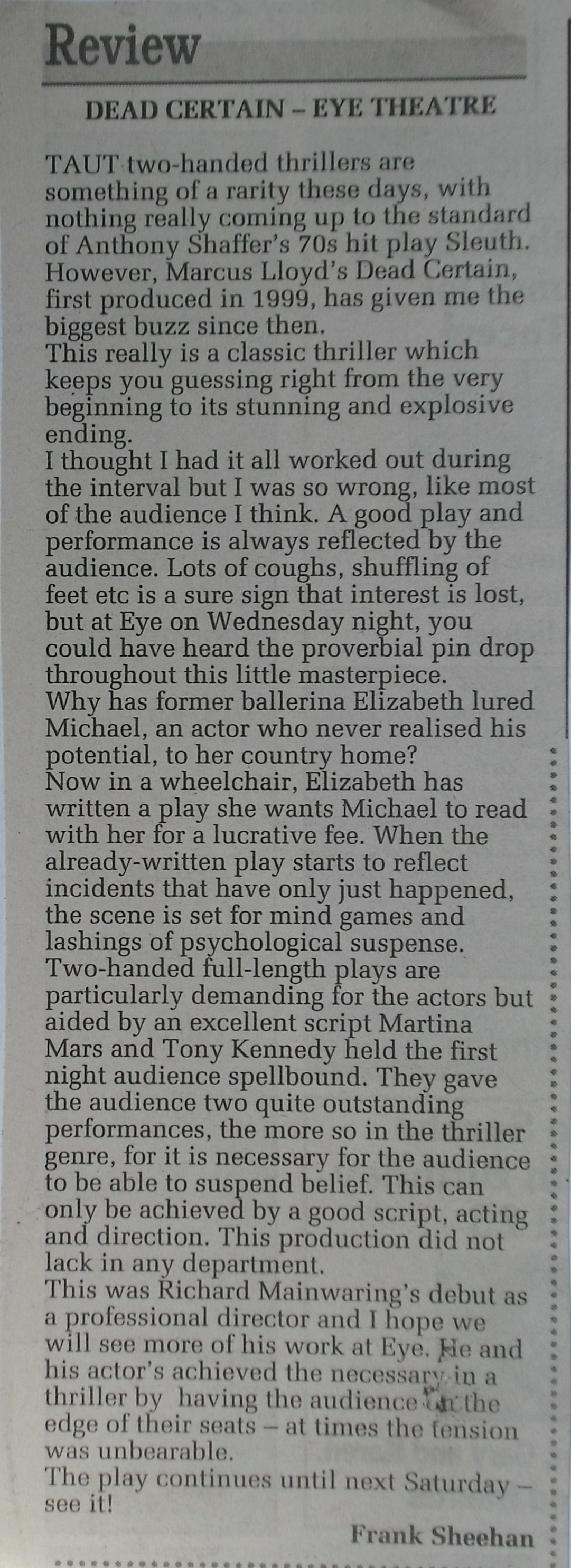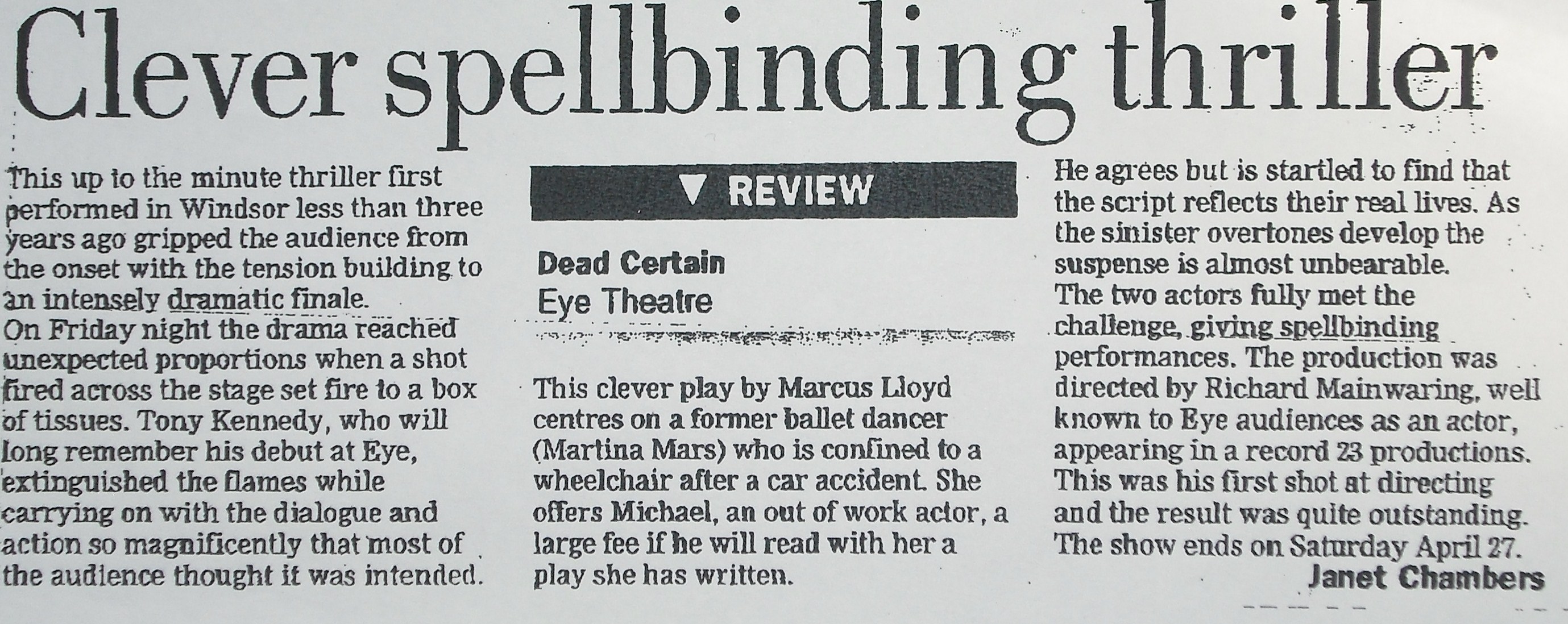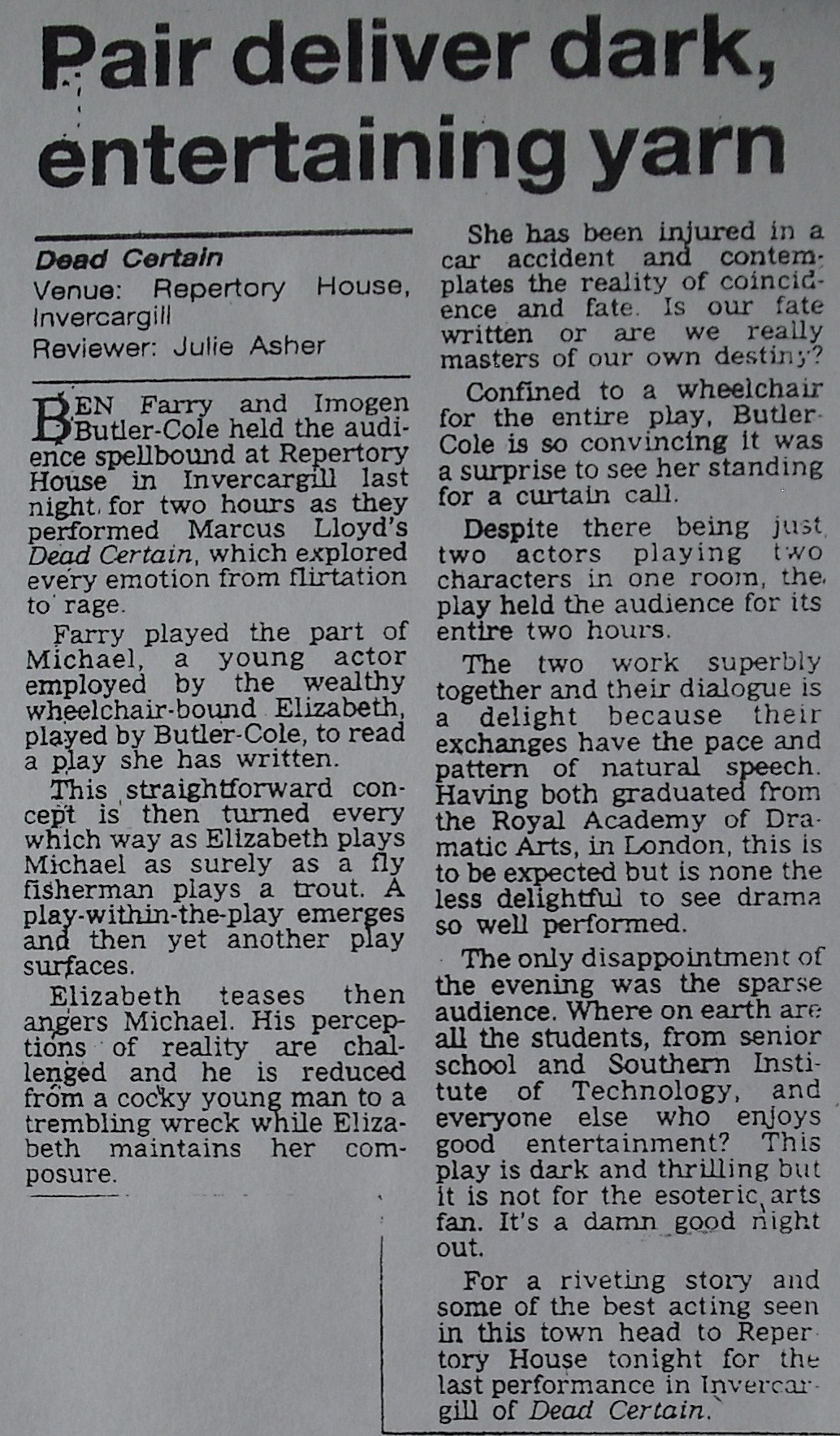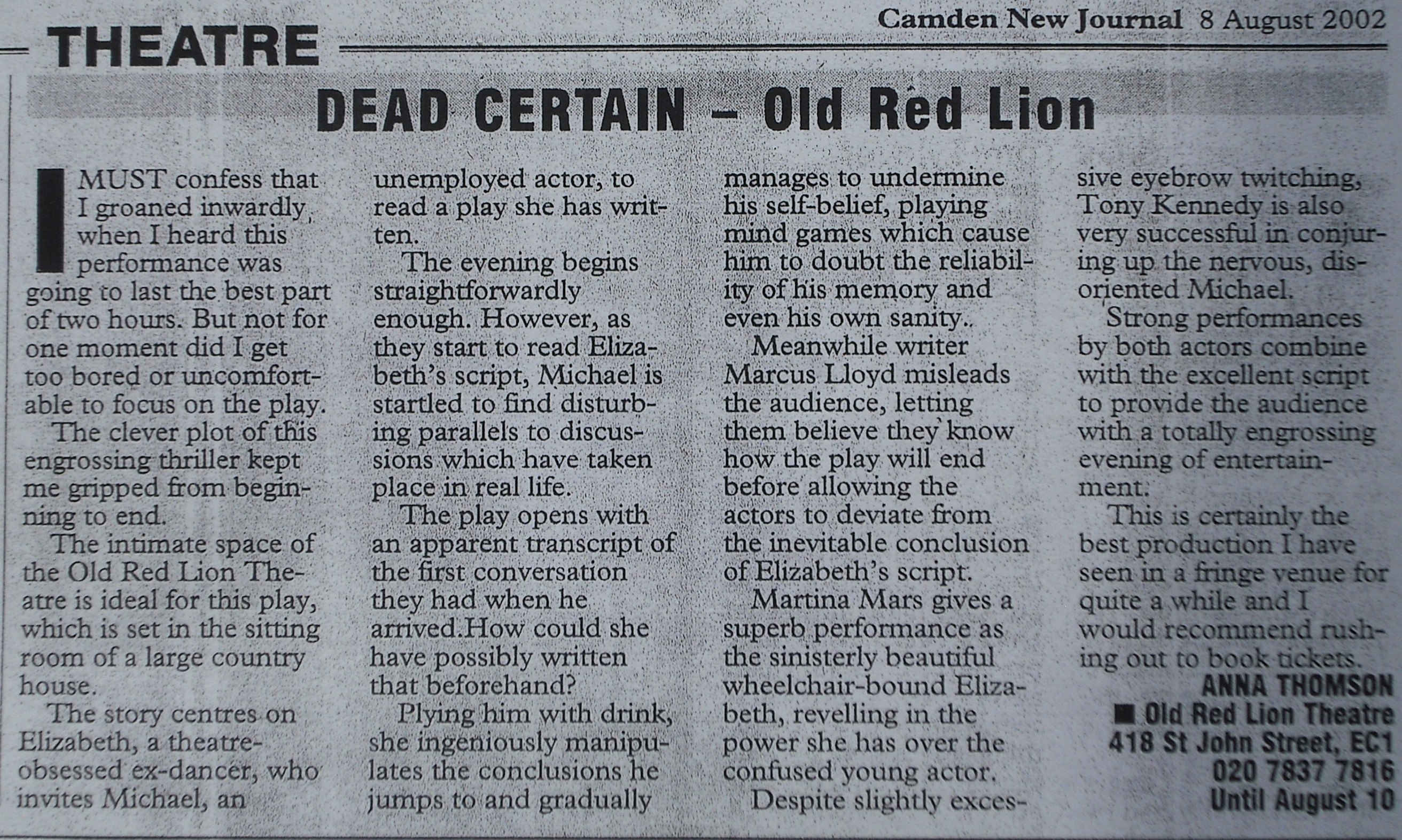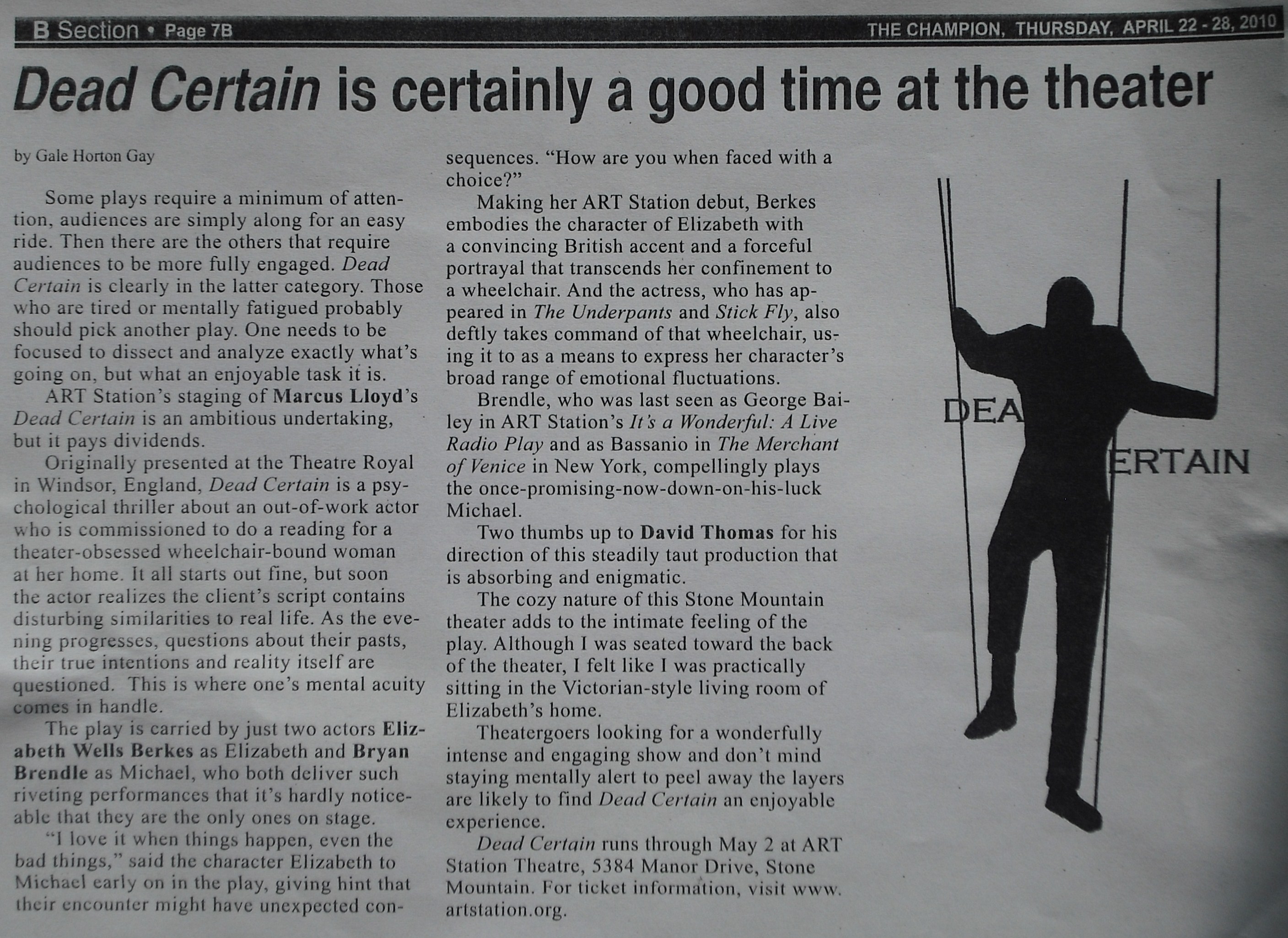|
Diss Express, 19th April 2002
Eastern Daily Press, 24th
April 2002
Southland Times, 25th July 2001
Camden New Journal,
8th August 2002
"Dead
Certain" Alive With Sure-Footed Suspense
By Kathleen Allen
Arizona Daily Star
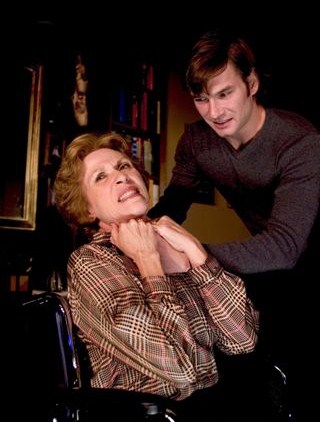 |
This is a fact of theatrical
life:
If you need an actress in an emergency to learn copious lines and
deliver them with finesse - in a little less than two weeks'
time -
call Maedell Dixon. Dixon is half of the cast in Invisible Theatre's
season opener "Dead Certain."
When the original actress bowed out a week before the scheduled Sept.
13 opening, director Susan Claassen wasted no time in calling in Dixon.
Wise move. At wednesday nights's performance, Dixon charmed, she
cajoled, she spit venom, and if she missed a line or two, she and
co-starMax Bird-Ridnell didn't let on.
Dixon
and Bird-Ridnell both did
impressive jobs at registering emotion, speaking with consistent
accents (no great trick for Bird-Ridnell - the Los Angeles-based actor
is originally from London), and grasping twists and turns in the
script, so that the audience always felt a little off-kilter. |
Because
they are so new to each other in this production, Dixon and
Bird-Ridnell missed some of the character nuances, and the suspense was
sometimes not as taut as it might have been. But give 'em a break - and
a few more days. By then, these two are sure to have the suspense built
to a frenzied level.
"Dead
Certain" is one of those rare finds: a well-crafted, two-charater play
with smart language and sweet suspense. It takes just five minutes to
discover with dead certainty what's going to happen in the play. You
just won't know you know it. and you won't likely guess how. And that's
the thrill of the suspense story. You'll be cocky with the knowledge of
what you think will happen. And you won't be alone: Listen to other
audience members during intermission. If they are anything like
Wednesday night's near sold-out crowd, there will be intense
conversations about exactly what was going to happen. And they were
dead wrong. And right.
It's
hard to believe this is Marcus Lloyd's first and only stage play. the
Londoner is busy penning scripts, film, television and radio; "Dead
Certain" is proof he should be doing it for the theater as well.
The
story begins as the handsome, young, out-of-work actor, Michael, is
having a hand bandaged up by a woman in a wheelchair, Elizabeth. It
seems he accidentally cut his finger on her chair. Michael has been
hired by elizabeth to read a script she has written, and it opens with
- what is this? - a character named Michael cutting his finger on a
character named Elizabeth's wheelchair. Spooky.
The
play has you thinking you know what's going to happen, but what you
think you know is goingg to happen changes every few minutes.
Claassen
has directed a clean production that is focused and designed to
underscore the suspense. There's very little suspense about this,
however: "Dead Certain" is one to see.
24th
September 2005 kallen@azstarnet.com
Playing With Perception
Forget the last-minute
problems at Invisible Theatre: 'Dead Certain' is a fascinating delight
By James
Reel
Tucson Weekly
| While
the identity of the author of Criminal Hearts, now at Beowulf Alley, is in
question, I have no doubt that Dead Certain, which opened last week at
Invisible Theatre, was also written pseudonymously. This mystery
thriller is credited to an Englishman named Marcus Lloyd, but surely
the true author is M.C. Escher, the artist whose prints toy with
symmetry and perspective, manipulating our quirks of perception and
causing us to believe in infinite loops of impossible objects. |
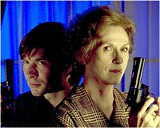 |
But let's give Lloyd the
benefit of the doubt when it comes to his existence, for Dead Certain is an extraordinarily clever
theatrical debut; it was first produced in England in 1999, and
Invisible Theatre seems to be offering its American premiere.
The lights come up
on Elizabeth, a theater-obsessed, wheelchair-bound ex-dancer, and
Michael, a handsome young actor who has been hired, sight unseen, to
come over and read through a play that Elizabeth has written. The
themes of her work, Elizabeth announces, are freedom, empowerment and
identity. It soon becomes apparent that she is talking about more than
her play.
The reading begins,
and Michael finds himself in a scene that almost exactly duplicates his
interaction so far with Elizabeth. How could this be? And how is it
that certain subtle touches in the script allude to details of his life
that Elizabeth, a stranger, couldn't possibly know?
To describe any
more of the plot would spoil much of the delight to be had as this play
unfolds. Suffice it to say that, early on, in response to one of
Elizabeth's odd interview questions, Michael declares, "Sometimes I
don't feel that I'm choosing; I'm just responding according to who I
am." Ah, but who is he, really, and just why is Elizabeth manipulating
him in this way? For, despite Elizabeth's protestations, it can't all
be coincidental. "I don't believe in accidents," she states ominously
early on. "In the end, you always find someone who is responsible."
And if you think
from what little I've written so far that you've got Elizabeth's
motivations figured out, don't be so sure. Lloyd adds one twist and
diversion after another as the end approaches, perhaps more twists than
necessary, and Elizabeth's true goals remain in question right to the
final blackout.
Dead
Certain owes much to Sleuth (best known
from its 1972 film version with Laurence Olivier and Michael Caine),
although Lloyd's play is more an homage to the earlier work than a
derivative of it. Lloyd also indulges in mischievous tricks that remind
us that we're watching a play about a play. Almost immediately, he has
Elizabeth casually display a pair of pistols, which she does while
explaining to Michael that a playwright must establish the presence of
a gun early on, in order to earn its use at the end. She also notes
that this often causes the audience to look for faint bloodstains on
the set from previous performances. And sure enough, we start eyeing
the flats more carefully. Just what is that smudge on the wall under
the framed Follies poster, anyway?
The Invisible
Theatre staff only encourages these sorts of audience games by dressing
the set with such books as Sweet Revenge and Alibi
for an Actress. This production is nothing if not detailed.
It was almost
derailed before it opened. An immigration complication forced the
English actor originally engaged to play Michael to go home just as
rehearsals were beginning, and the actress cast as Elizabeth had to be
replaced a week-and-a-half before opening night. The opening had to be
delayed a week to give the new actress time to get up to speed.
But you'd never
suspect any of this from the performances. If Maedell Dixon, one of
Tucson's most valuable theatrical pros, had any little memory slips on
opening night, she folded them smoothly into Elizabeth's slightly
flighty nature early in the play. Dixon somehow unified all the
disparate aspects of Elizabeth's character. If we were never sure
exactly when we were seeing the real Elizabeth, we never saw a false
Elizabeth; everything about her ultimately made sense.
As Michael, perhaps
Max Bird-Ridnell was a bit too self-assured in the early scenes,
considering that he was playing an out-of-work actor with a
self-destructive streak, but it's important not to give too much of
this away too soon. Polite, easily embarrassed, but direct when he
needs to be, Bird-Ridnell's Michael displays the firmness he'll need to
try to wrest control of the situation from Elizabeth, but you can
meanwhile sense the soft core that has been his lifelong downfall.
Director Susan
Claassen keeps the action moving cleanly, while encouraging her actors
to relish their characters' ambiguity without losing focus.
We
leave the theater with the nagging feeling that what we've seen is more
a remarkable literary stunt than an honest play, but it's no less
involving for that. Dead
Certain is
less a script than a M�bius strip, a one-sided surface twisting back
around upon itself in a perpetual loop, and that's the sort of thing
that can provide endless fascination.
29th
September 2005
(click
here for this review on the Tucson Weekly webpage)
Thriller "Dead
Certain" Full Of Psychic Mind Games
Wednesday, May 17, 2006
By Liz Keill
Independent News
It's
a rare treat to see as tautly written and performed a play as "Dead
Certain," currently gripping audiences at The Bickford theatre in
Morristown.
Even
being a mystery fan, I haven't seen many psychological thrillers this
absorbing. It's in a class with "Sleuth" and "Deathtrap."
In
Marcus Lloyd's clever, warped plot, the protagonists are Elizabeth,
confined to a wheelchair and Michael, and actor who has arrived at her
home to help her act out a play she has written...or so he presumes.
But
that's when the twists and turns begin. we're never quite sure if
Elizabeth is insane, incredibly cunning or a victim of circumstance.
Michael, too, gradually shifts from being a "nice guy" to a troubled,
addictive personality.
The
actors in this mystery are well cast. Liz Zazzi as Elizabeth holds
center stage as she zips around in her wheelchair. Her description of
the accident that caused her paralysis is especially haunting.
Clark
Carmichael plays Michael, the actor who discovers layers that he has
carefully kept hidden from himself. Both actors project the British
accents appropriate for the English countryside setting.
Bill
Motyka's set is a stunning replication of a formal drawing room, with
paneled wallpaper and detailed cornices. Before the play begins, the
shadow of a ballerina glides across the background. Motyka also
designed the lighting, contributing to the eerie effect. David
Sampson's original music is just atonal enough to be disturbing. there
are sound effects, too, well timed by Roman Klima.
But
the master of this production is the Bickford's artistic director, Eric
Hafen. There is never a dull moment in this cat-and-mouse game of
illusion, revenge and murderous intent.
Playwright
Lloyd, who is from London and studied at Oxford University, has written
just two plays. His "Taking Pictures" was honoured at the New London
Radio Playwrights Festival. He has also written, for the BBC, a
television play called "A Relative Stranger."
"Dead
Certain" makes for a spell-binding evening of theater. As with any
great mystery, exposing too much plot is a dangerous thing.
Performances continue through June 4. The Bickford Theater is located
in the Morris Museum, 6 Normandy Heights in Morristown. The museum is
currently undergoing renovation and a new wing is being added, which
will house a mechanical musical instrument and doll collection. While
the temporary ramp isn't as welcoming as the theater's glass-enclosed
entrance, it's a minor inconvenience.
Independent News, New Jersey. NJ.com
 It’s Black Box Theater
Wednesday again we have a surprise pick
this week as The Cool Guy recommends Dead Certain, playing much too
quietly at the Gene Frankle Theater in the West Village. It’s Black Box Theater
Wednesday again we have a surprise pick
this week as The Cool Guy recommends Dead Certain, playing much too
quietly at the Gene Frankle Theater in the West Village.
Directed by Andrey
Esterlis, this thriller, seen Friday last at the 8:00 PM show, was
written by Marcus Lloyd in classic, suspense, edge of your seat,
fashion that took the audience around one blind corner after another of
a carefully crafted and carefully controlled sequence of story telling
events. In my opinion, this production is the sleeper of New York
City’s black box theater season to date.
This gifted writer
tells the tale of a crippled dancer seeking twisted revenge from an
actor she blames unjustly for her lot in life. Hiring the unsuspecting
Michael Boyd to assist her complete a script she is working on, Michael
is slowly led to act out, through his own improvisational skills, the
plot of Elizabeth Bartlett’s play only to realize the evening’s true
purpose is to agonizingly revive his memory of a womanizing, selfish
attitude nearly ten years past that, in her mind, caused her the use of
legs.
As story unfolds
we see Michael slowly degrade from a confident, polite, professional to
an angry bent on revenge himself madman,which is exactly what
Elizabeth’s plan called for.
The play is
limited to a cast of two, which makes a great mystery tale even more
difficult to pull off if the script is not absolutely perfect.
Mr. Lloyd’s Oxford
education was on display in this excellent work and it only goes to
prove what an above average foundation in literary skill combined with
mindful direction can do to produce a complete and unblemished
theatrical product.
Lee says this one
is a must see!
Here is what you need to know:
Gene
Frankel Theatre
24 Bond St. NYC NY
Opened
July 12, 2006
Closing: July 23, 2006
The Shows: Tue – Sun at 8pm; Fri – Sat at 10pm
Tickets: $15 – $20
(click
here for this review on the retrovision media webpage)
SF STATION
Dead Certain
Chekov’s Gun Control (Or Lack Thereof)
By
Clifton Lemon (Mar 15, 2007 )
|
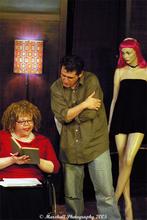 |
David
Denby, writing in The New Yorker on March
5th of this year, commented on the recent trend in films of deploying
increasingly complex, overlapping, fractured narratives. Think Memento,
Pulp Fiction, Babel,
and Amores Perros. It’s not only a film
trend though, and it’s actually been going on for several decades -- or
more if you look back to the early twentieth century.
One might wonder if this is something of an
evolutionary imperative -- do we need complex, multilayered narratives
in our entertainment in order to make sense of our complex,
multilayered modern lives? British playwright Marcus Lloyd has taken
narrative to a new level of art in his first stage play "Dead Certain",
originally produced in 1999 in England, and presented in San Francisco
at the Off Market Theater.
Elizabeth, a chirpy, bossy paraplegic, ex-dancer, and ostensible
budding playwright with a mind like a steel trap, has hired Michael, a
handsome, charming off-off-Broadway actor with the slightest
continental accent and earnest, deferential affect, and invited him to
her flat one evening under the pretext (or not) of getting him to read
her new play. Blood and firearms appear immediately, but things seem
innocent enough for the first ten minutes or so (the blood, which turns
out to be fake, is from a harmless accident -- apparently -- and the
guns are fake -- or are they?)
Then they start to get weird, and weirder, and weirder still. It turns
out Elizabeth seems to only have the barest outline of a play put
together and doesn’t quite seem to get how actors work with scripts.
Michael patiently explains his limits, only to have them immediately
challenged by Elizabeth, who despite her bubbly warmth, insists on
calling all the shots (in every possible sense of the expression).
Just when we begin to suspect she’s hired him simply to seduce him (the
first scene they try out is a kissing scene), she brings him back to
the beginning of her script, which turns out to be the first ten
minutes of the play we’ve just witnessed, word for word. Uh-oh. What’s
happening, we’re thinking, along with Michael, who begins to smell a
rat (or could that be a cat?) As his anger and
suspicion build, Elizabeth lets him out and reels him back in, always
two or three tricks up her sleeve ahead of her hapless victim, her
cheerful patter strategically laced with murky insinuations, nasty
barbs and sly little slips that leave a sour aftertaste.
“You are quite susceptible to suggestion,” she proclaims to the
befuddled actor. Anyone else would conclude that this chick was totally
whack and get the hell out on the double, but Michael’s vanity,
curiosity, desperation, and eventually his fear keep him locked in this
deadly end game. “Don’t do it!” we want to yell at him, “Don’t listen
to her!” And yet, a minute later, we’re thinking “Hmmm…that was a
brilliant stroke of plot on her part -- maybe she is just a talented
budding playwright after all, and maybe a damn good one at that.” Are
we also being tricked into blatantly admiring the actual playwright?
Mr. Lloyd plays with the structure of this work like it’s a new toy:
it’s like a series of nested Chinese box puzzles, each more complex
than the last. Every turn of the action changes the game entirely.
Almost immediately, we sense that every tiny detail -- the dialog the
set, the action, the costumes -- demands our attention, like we’re CSI
agents looking for clues to a crime before it’s committed. This has the
effect of turning everything in the play into a Chekov’s gun.
And to top off the bedeviling intricacy, the real guns in the play are
pointed out (early on of course) by Elizabeth, the playwright, who has
a line like this: “there’s some kind of rule about guns…if you
introduce them early on…oh I forget.” She hasn’t forgotten a thing,
except perhaps the most important thing…but of course I am officially
prohibited by the universal code of critical ethics from revealing too
much more about the action, especially the ending.
The narrative really is the hero of the play -- it’s the third
character, and the two actors move it along so masterfully that you
begin to lose all your bearings, but find yourself strangely enjoying
the confusion. Losing your bearings usually leads to boredom, but in
your confusion you’re actually empathizing with Michael, who is just as
confused as we are about what’s real and what’s not. This is a play
within a play within a play…to the point where you lose track of the
original context and get caught up in the action, which all along seems
to be controlled completely by Elizabeth. She and Michael are locked in
a deadly duet, the kind of Titanic end-game power struggle that we see
in Sam Shepard’s "True West".
This type of vehicle can only succeed with virtuosic acting and
directing, and Diana Brown’s Elizabeth and Andrey Esterlis’ Michael are
perfectly tuned, timed, and in sync. I marveled at their ability to
memorize massive amounts of rapid-fire dialog while fully inhabiting
their characters with beautifully controlled and modulated delivery.
It’s also brilliantly produced and directed by Mr. Esterlis -- it would
appear that he’s actually pulling the strings after all, in reality (if
you still believe in reality after this play). The set and lighting are
also perfectly balanced and enhance the chilling impact of this
excellent production, and the small black box theater gives the piece
an intimacy and sense of danger that makes your palms sweaty. A
standing ovation for this deadly jewel of a play.
Dead Certain
Runs through June
At the Off-Market Theater
Tickets: $20-30
(click
here for this review on the SFStation webpage)
|
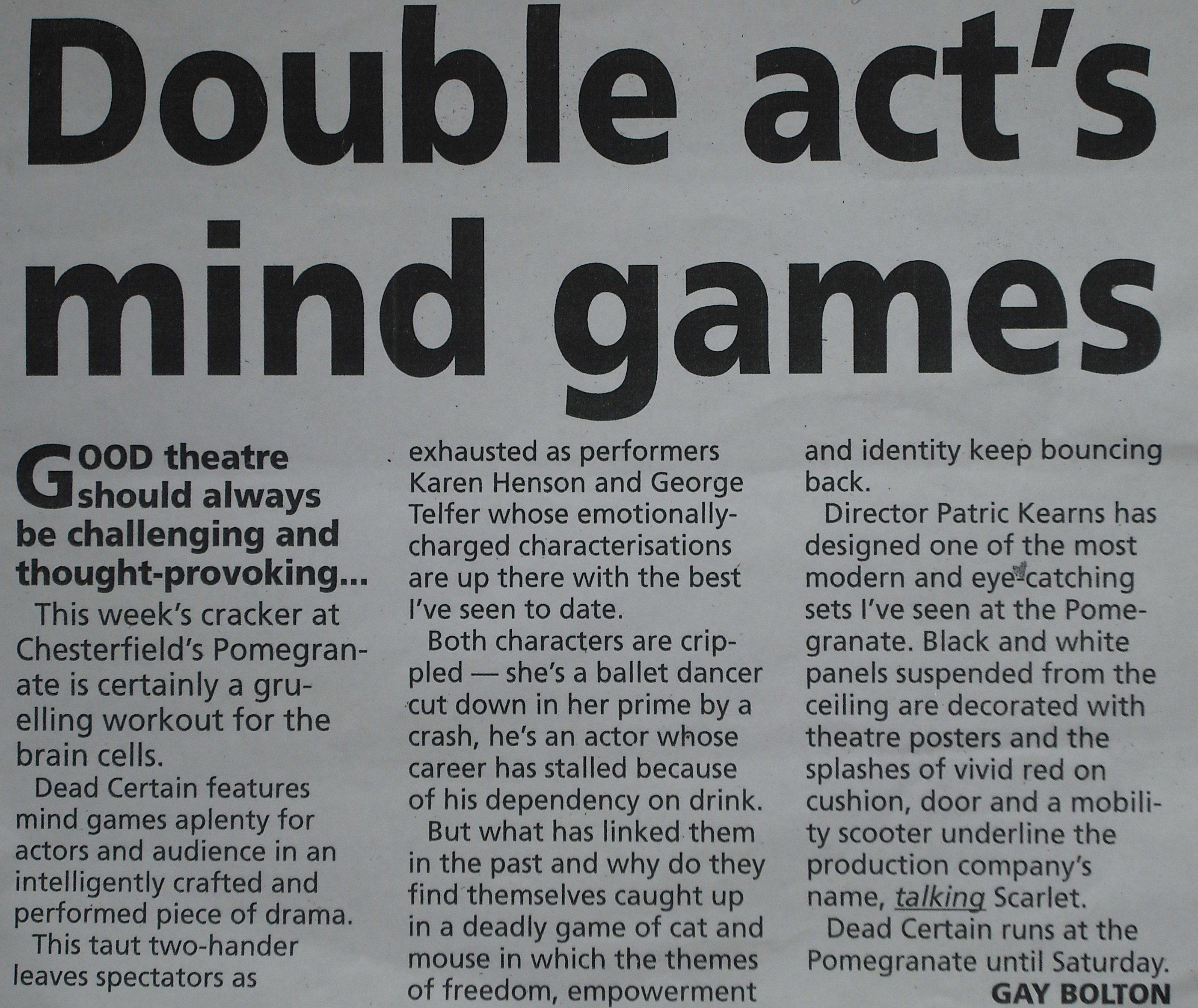
Derbyshire Times, 2nd March 2007
The Champion, Atlanta April
22, 2010
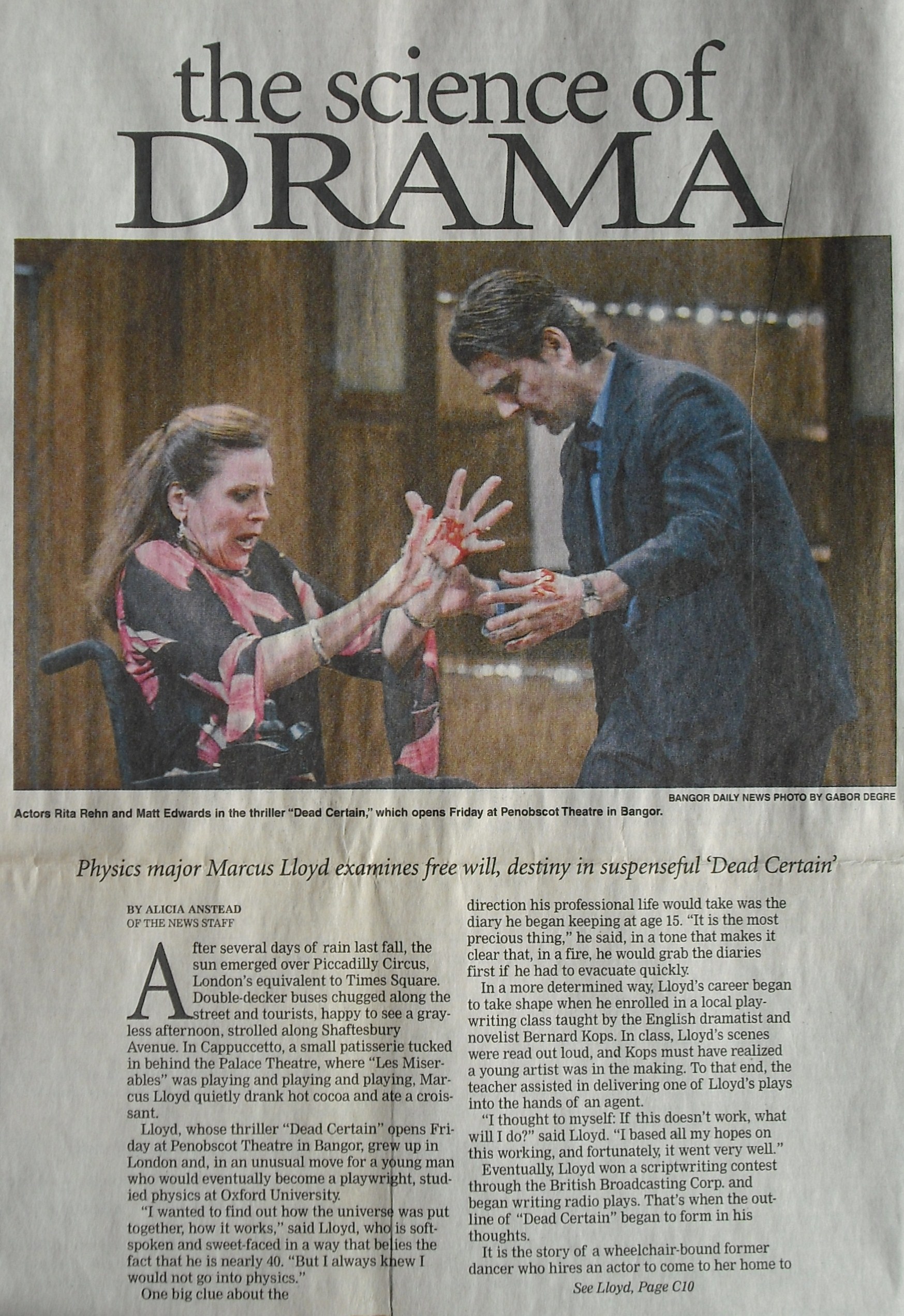
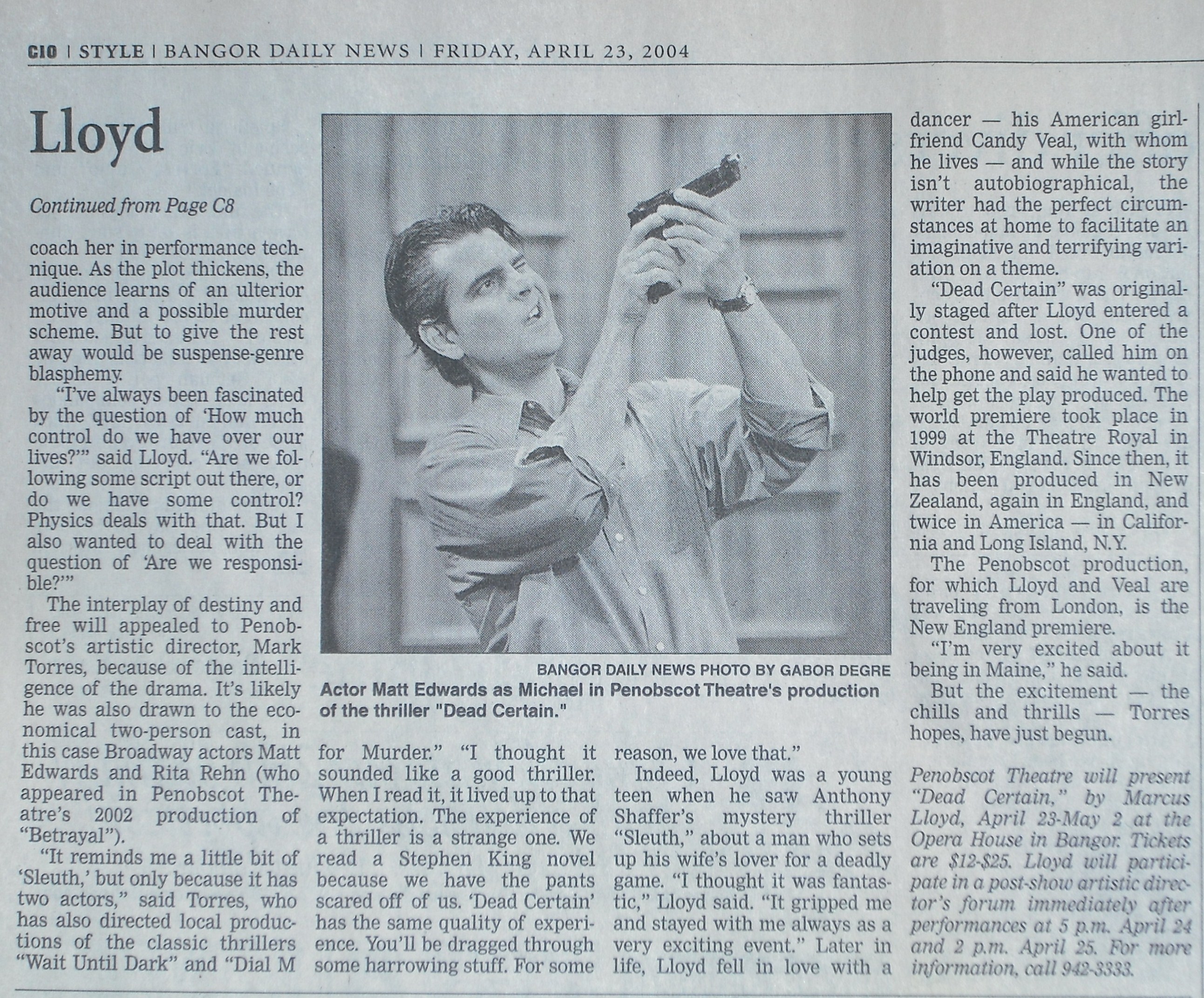
Bangor Daily News, Maine, 23rd
April 2004
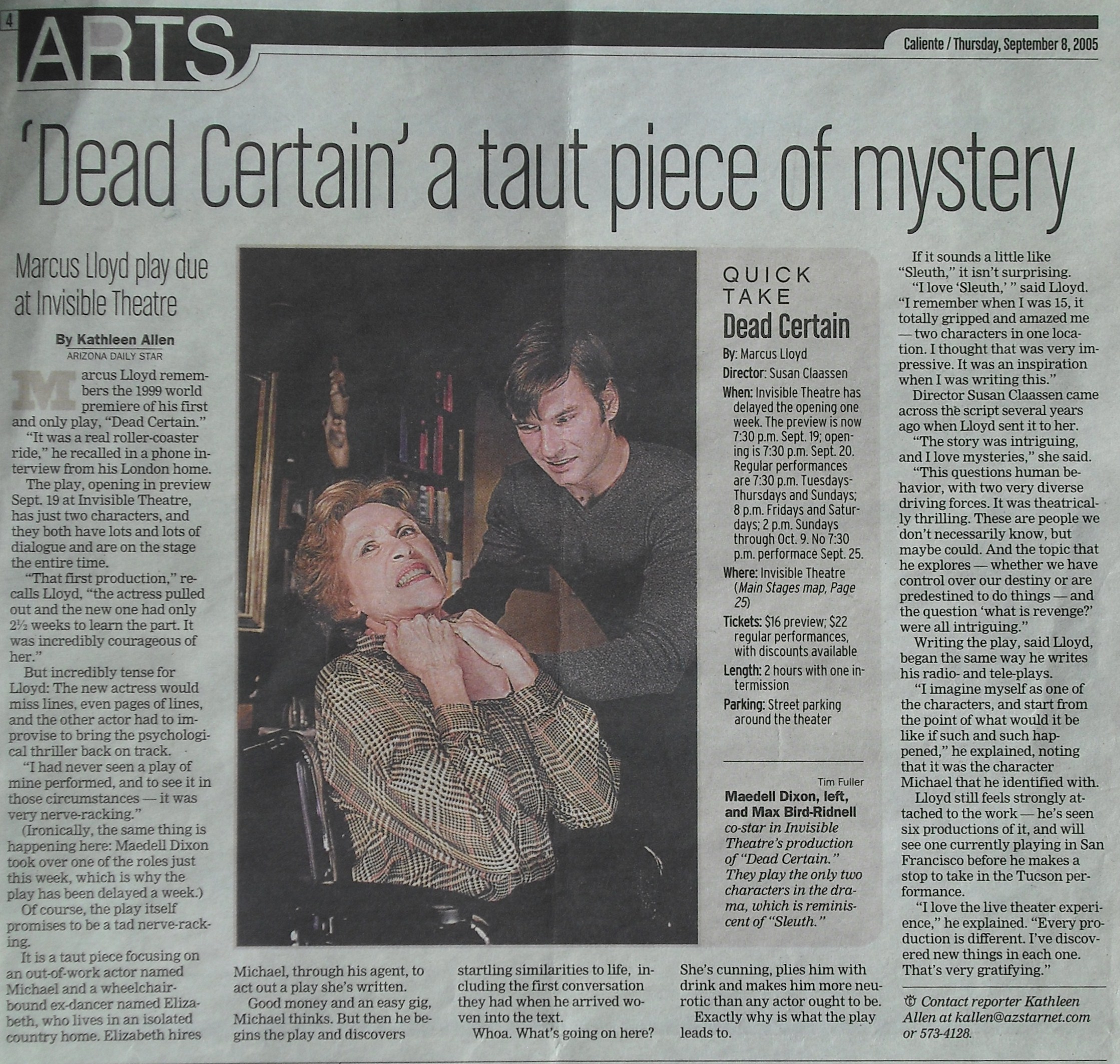
Arizona Daily Star, 8th
September 2005
|
|
 It’s Black Box Theater
Wednesday again we have a surprise pick
this week as The Cool Guy recommends Dead Certain, playing much too
quietly at the Gene Frankle Theater in the West Village.
It’s Black Box Theater
Wednesday again we have a surprise pick
this week as The Cool Guy recommends Dead Certain, playing much too
quietly at the Gene Frankle Theater in the West Village.